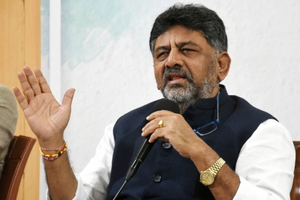Karnataka Deputy Chief Minister D.K. Shivakumar secured a significant legal victory when the Karnataka High Court dismissed a petition demanding a Central Bureau of Investigation (CBI) probe into his alleged disproportionate assets. The decision, delivered by a division bench led by Justice K. Somashekar, provided temporary relief to the senior Congress leader, marking a critical juncture in a case that has seen extensive political and legal wrangling.
The court’s decision came in response to a petition filed by BJP MLA Basanagouda Patil Yatnal, which sought to challenge the Karnataka government’s withdrawal of consent for a CBI investigation. The initial consent had been granted by the previous BJP-led state government, helmed by B.S. Yediyurappa, to probe allegations that Shivakumar had amassed wealth beyond his known sources of income during his tenure as a minister between 2013 and 2018.
In its ruling, the High Court emphasized that the Supreme Court is the appropriate forum to adjudicate disputes between the state government and the CBI in this matter. This ruling effectively quashes the CBI’s attempt to pursue the case further at this stage, although the possibility remains for the case to be taken up by the Supreme Court if the CBI decides to appeal.
Shivakumar has consistently denied the allegations, framing the case as politically motivated. Following the court’s decision, he reiterated his faith in both the judiciary and divine justice, stating that he would accept any verdict as “God’s will.” His legal defense team, comprising prominent advocates including Kapil Sibal and Abhishek Manu Singhvi, argued that the CBI’s involvement was unwarranted given the state’s withdrawal of consent for the investigation.
The case has drawn considerable attention due to Shivakumar’s prominent political position and the implications of the court’s ruling for ongoing investigations into political figures in India. With the Karnataka High Court’s decision now in place, the legal battle may shift to the Supreme Court, where the broader issues of state versus central authority in criminal investigations could be addressed.
As the political landscape in Karnataka continues to evolve, this legal development adds another layer of complexity to the ongoing power struggles within the state. The High Court’s ruling may not be the final word on the matter, but it certainly provides a momentary reprieve for one of the state’s most influential politicians.




 Paytm Shares Jump 5 Per Cent On Receiving Govt’s Nod For Investment In Paytm Payments Services
Paytm Shares Jump 5 Per Cent On Receiving Govt’s Nod For Investment In Paytm Payments Services 